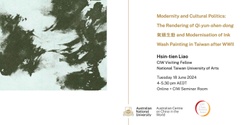Modernity and Cultural Politics: The Rendering of Qi-yun-shen-dong and Modernisation of Ink Wash Painting in Taiwan after WWII
Event description
Proposed by Xie He of the Southern Qi Dynasty in about 500 CE, qi yun shen dong (“vividness of energy and rhythm”) is regarded as the highest aesthetic conception in Chinese art, both in practice and theory. Nearly all Chinese artists endeavor to fulfill this aesthetic value. Following the Republic of China’s “relocation” to Taiwan in 1949, Chinese painting became dominant, replacing Japanese styles and forms. In fact, the political transition reflected the struggle of identification: Taiwanese art was de-Japanized and re-Sinicized and was also subject to modernisation. How was qi yun shen dong understood in this context? Should the new art be taken as an extension of traditional art or as a new modern style that is related to western abstract painting? How should we decipher the movement culturally and artistically? In this seminar, I will analyze several examples to show that the modernisation of Chinese art was metamorphosed through the impact of cultural politics. Modern Chinese ink wash painting in Taiwan can be seen as refraction (or reflection) of zong xue wei ti, xi xue wei yong 中學為體西學為用(Chinese essence and Western utility). The amalgamation of traditional and western cultures signalled the problematic of cultural identification in Taiwan after WWII.
About the Speaker
Professor Liao Hsin-tien obtained PhDs in both art and sociology. From 2010-13, he taught Taiwanese history, culture, and art at ANU. Returning to Taiwan, he became Dean of the College of the Humanities at the National Taiwan University of Arts, Director-General of the National Museum of History, and an award-winning host of an art-focussed radio programme. He looks at Taiwanese art through the perspectives of postcolonialism, visual culture, and cultural politics; he also researches Chinese calligraphy and aesthetics. He has published 12 books and is currently editing a new book on modernization of ink wash painting.
The ANU China Seminar Series is supported by the Australian Centre on China in the World at ANU College of Asia and the Pacific.
Tickets for good, not greed Humanitix dedicates 100% of profits from booking fees to charity

